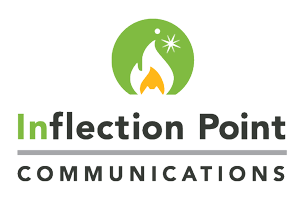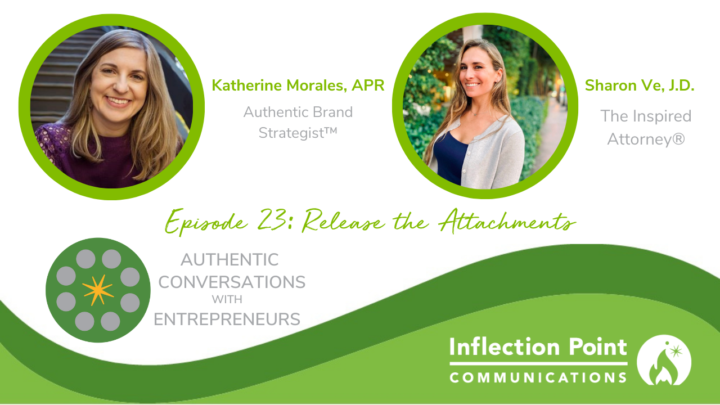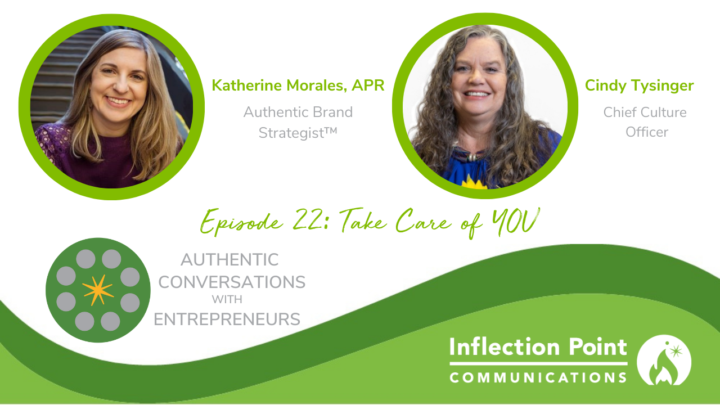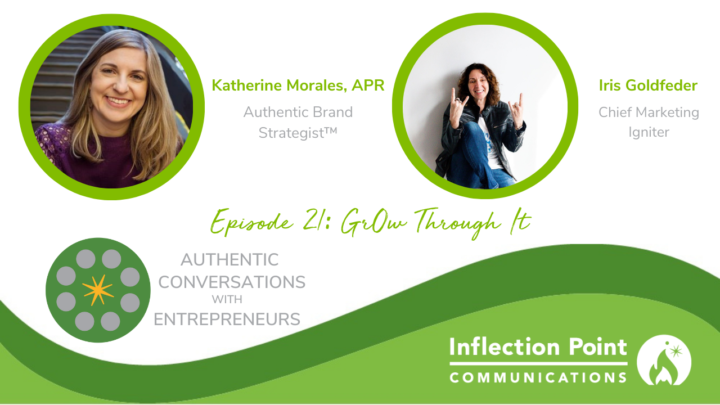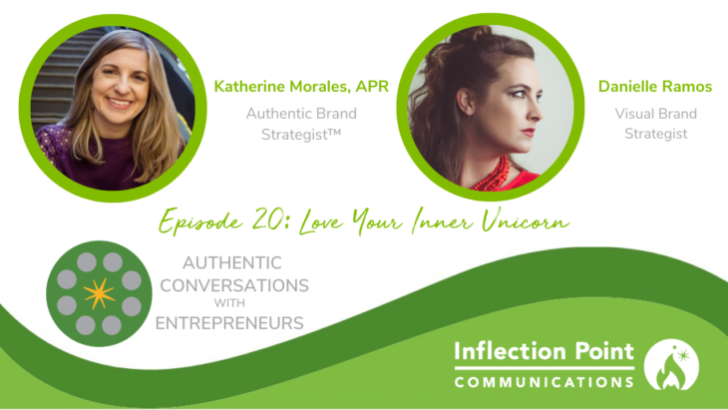In this episode of “Authentic Conversations with Entrepreneurs,” I had the pleasure of speaking with Story Mentor Brian Perry, as he shared his Authentic Story of learning how to write and LIVE his own story! This is for the entrepreneur who has ever felt caught in a place where you’ve lost your direction, felt self-doubt and/or become stagnant in your journey of life & business.
Katherine Morales: Hi, everyone. Thank you so much for being here. Welcome to episode three of Authentic Conversations With Entrepreneurs. I’m Katherine Morales, an Authentic Brand Strategist, and founder of Inflection Point Communications. I am so excited to be here today with Mr. Brian Perry. He is a story mentor and founder of Yes, Brian Perry, which you will soon find makes a lot of sense. Because all you want to say when you talk to Brian is, “Yes.” He already had me laughing, so that’s a good thing on St. Paddy’s Day. And now, I always have green for my brand. It’s not just because of St. Paddy’s Day. But-
Brian Perry: Yeah, I realized I didn’t have to wear green, because it’d already be green on the screen.
Katherine Morales: All over, right?
Brian Perry: Yeah.
Katherine Morales: Yeah. Brian, I’ll give you more chance to, obviously, talk, but I want to share that you are a singer. You are a Brian of all trades, right? You are a singer, songwriter, copywriter, author, speaker, and as you always say, the guy who writes on the back of his car. Always very powerful messages. So thank you so much for being here. As I said, this is our third episode of Authentic Conversations With Entrepreneurs. What this is all about is connecting with the human side of entrepreneurship. I think that having an authentic conversation is about exploring the truth of being an entrepreneur.
Not just all the success and wins, but the challenges, and the mountains that we climb and overcome. So I want to thank you in advance for being so bold to share your bold story. Thank you, Brian, because this episode is all about being your story. So I know our viewers are really excited to hear what that’s all about. So I want to just begin by asking you when did you first hear this message, “Be your story?” What has it come to mean to you? Where did you first hear it?
Brian Perry: Thank you for having me, first off.
Katherine Morales: Yeah, of course.
Brian Perry: I’m grateful to be part of this conversation. I think that inauthenticity is a waste of time. In that we get this one wild and precious life, as Mary Oliver says, and it’s just silly, it’s nonsense the way we hide. I understand the instinct, too, but it’s not productive.
Katherine Morales: That’s why I had to have you on, Brian.
Brian Perry: But I will say, it was less that I heard it and more that I lived it. When I was writing this post that you put up today…
Katherine Morales: Our blog post.
Brian Perry: …Or a couple days ago, a blog post, it reminded me of when I was writing my most recent book, accidentally. The book’s not called accidentally. I wrote the book accidentally.
Katherine Morales: A good title, though.
Brian Perry: Should be, right? The book’s called The Myth of Certainty and Other Great News. Part of how that all happened, I remember I was working at a job that was the last branch I caught before I hit the ground. And I was sitting in the parking lot, just bitter and pissed off that I had to be going in there. And I realized that I couldn’t be out in the world, endeavoring to do the things I love to do, serve in the ways that I want to serve, build the dreams I want to build, that are fundamentally about being the change you wish to see. And I couldn’t do that and then go into this job, bitter and pissed off that I had to be there.
Somewhere in there, it helped me get to that my great suffering was coming from my great attachment to the big job, or the big book, or the breakthrough song, or the next relationship. My attachment to those was causing me pain. What’s going to happen when they fell away? But the suffering was something that I was causing myself. So it occurred to me that, too often, we think that our story is about our achievements, these arrival points. And it occurred to me that, in fact, there’s no such thing, that everything in my life passes through. Every arrival point, every pain, every joy comes and goes. Which means that I’m not one story, but a collection of them. And that ultimately, that’s what it is. I get to be my story. I’m writing a story I live in, living a story I write.
Katherine Morales: Love it. I love it. And you all have to read Brian’s blog post, which I’ll share the links for you to check that out. But I think, so and Brian’s book, Myth of Uncertainty is a great read.
Brian Perry: The Myth of Certainty.
Katherine Morales: Oh, thank you.
Brian Perry: No, happens all the time. It’s really funny. I mean, it’s clearly a convoluted title because it happens all the time.
Katherine Morales: Thank you for correcting me. But with your journey of entrepreneurship, because you mentioned the being outside the job and not wanting to go in. But obviously, that preceded your journey of entrepreneurship. So in what ways has living your story, have you always done through your journey of entrepreneurship? Or have you struggled with it at times and revisited it?
Brian Perry: You mean struggled with living my story. Is that what you mean?
Katherine Morales: Yeah. And feeling that everything you just conveyed.
Brian Perry: Oh, absolutely. And in fact, I would say that… What?
Katherine Morales: I said, you come back to it. As a reminder.
Brian Perry: Absolutely. By the way, I would say the premise of your question, which was that moment outside the job was outside my entrepreneurial journey, is untrue for me. I mean, my entrepreneurial journey started as a singer-songwriter.
Katherine Morales: Oh, right. Yes.
Brian Perry: And like many other artists, that meant that I was working in coffee shops and restaurants and all kind of other places. So-
Katherine Morales: A van across the country. Yeah.
Brian Perry: Exactly. So for me, it’s always been a journey to how can I get to a place where I can be fully engaged in my entrepreneurial journey? Which I never looked at that way, to be honest, in my artistic journey. And live. For me, it’s always been wanting to have the freedom to live, and do things that were core to me and central to me. And I lost the thread of your question.
Katherine Morales: Well, and it’s OK. It’s an authentic conversation that way, right? Now, another thing I want to hit on is you talked about attachment. And what I was thinking is, so do you think that some of the struggles that we, as human beings in the condition of living in society today, do you think that some of the struggle in living into your story and allowing it to be written as you go, right? Do you think some of that is an attachment of what you want it to be versus what it is?
Brian Perry: A hundred percent. And it misses the true opportunity. It’s too many of us. Well, too many of us, I think are, our lives will begin when?
And I would say that my journey has been a combination of trying to actively conflate the wisdom of people like Joseph Campbell saying, you have to give up the life you planned in order to welcome the life that’s waiting for you. And the wisdom of many gurus over the years about showing up to the now. And that my attachment to what something would look like has too often pulled me out of the experience of it actually unfolding in this moment. When I’m doing my own daily, I do daily practice of… Well, it’s called a lot of different things. Visioning, manifesting, whatever the hell you want to call it. But I do a lot of offering clarity about what I actually want. The way I look at it is, offering the ingredients to the great chef and my personal chef in the sky about what I’d like the flavors of my life to be.
And I have ceased to reference things as if when I get here, now it’s more about, I see myself. I’m living ever more deeply into this dream that I’m articulating now. So that the advantage of that is that it directs my attention to the ways that my dream come true is happening today. I’ll give a very specific example. I’m sitting at my desk right now. My guitar is right next to me, because my guitar was always right next to me at my desk. And the whole point of making, for me, some people go into music to meet girls or something. But for me, that was never it. For me, it was always about something else. And fundamentally it was about, I want to do this so that I can do it.
Right? I want to succeed because if I succeed, then I’ll have the opportunity to write more songs, and share more songs. And it’s true across all the things that I do, not just music. But the kicker is, in that particular segment of what I do, is that the way you succeed as a songwriter is by writing more songs. And if the entire time you’re doing that, all you’re focused on is that none of this will be real or matter until, name your artist. I think somebody in this call said Ed Sheeran. I won’t have succeeded until Ed Sheeran records my song. Right. There you go. Now can’t even hear me anymore. You can’t even hear me.
Katherine Morales: No, I’m listening. I’m totally hearing it. I love Brian Perry, too. Yes, yes. To Brian Perry’s music.
Brian Perry: If I’m constantly focused on “None of this matters until I get there.” Then I’m missing that in this moment, I’m writing songs, which is the whole point.
Katherine Morales: Oh yeah. Yeah.
Brian Perry: If I want to be wealthy so that I can afford to, I don’t know, eat out more. And all I’m focus is on how I’m not wealthy enough, then I’m going to miss it when I’m having lunch with a friend.
Katherine Morales: Yeah.
Brian Perry: And that’s me actually doing the damn thing. So it’s that, yeah. There you go. So I think the attachments get in our way, because they pull us away from the ways we’re living it today. So I think it’s useful to attach to the experience of life we want, but not attach to what that would specifically look like. And as an entrepreneur, when I failed to do that, I can stay way too long in an offering or a service or a product that people are telling me isn’t what they’re after. And I can miss that they’re telling me what they are after. Does that make sense?
Katherine Morales: A hundred percent. Yeah. And I think one of the ways that I say it, I mean, you made me think of so many things, I’m sure our viewers too. But I kind of-
Brian Perry: I see Dorrington here. Hey, Dorrington.
Katherine Morales: I try to catch myself and I say, don’t tell a story untold. Whether that’s a positive one or a negative one. But when you start to write the end of the story versus imagining the good or the bad, you’re not in the now.
Brian Perry: Yes.
Katherine Morales: And the other thing I think that I want to hit on that I know is one of your words is permission. And literally today on LinkedIn, I saw a post and woman talking about don’t wait to enjoy the moment and X, Y, or Z. And I thought back and I put it in the comment. I thought back to years ago when I got a bottle of champagne, a really nice bottle of champagne for my friends, for my birthday.
And I was like, “Oh, this is so special.” I put it in the fridge. It stayed in the fridge for a year. And I did not give myself permission to have that, pop open the bottle and have it with friends until I got a new job. And I had a whole thing, the friends came over. But it wasn’t until I got, that was in my 20s. It wasn’t until I got a little older, that I realized I never was going to do that again. So I think it’s not just… I mean, that’s a tangible thing, but I think permission is a word that you use that I wanted to bring in here. So anything else you want to add to that?
Brian Perry: Yeah. I’ll offer two things, specifically to the permission piece. I’ll say there was an interview I heard with Oprah a while back that I’ve now listened. I can’t remember how many times I’ve listened to it. Many, many times now. And one of the things-
Katherine Morales: She gives some pretty good ones.
Brian Perry: She was talking about the importance of creating quiet to hear our inner wisdom. And she was talking about her awareness that when she starts reaching out to people, even people she trusts very, very deeply, saying, she was using a simple example. Like shoes, like, “Should I buy these shoes?” You know whether you should buy those shoes. You’re asking somebody outside of you to give your permission.
And I think that everything about my life, my personal journey, my entrepreneurial journey is made better when I create space and quiet to listen to and understand my own inner wisdom. And while there is certainly value in getting feedback and talking things through, when push comes to shove, I know who I am and what I want. And the sooner I can get around to giving myself permission to do that awkwardly, unsurely, the better off I am. There’s nothing… And it’s just such an old cliche, but it’s true… Nothing you’ve ever done that was worthwhile came without moving through some fear.
And that fear comes from giving myself permission to do it badly first. And second thing I’ll say was that one of the things that hit me with an “aha” for me in that job that I referred to earlier was, I realized as I was walking around, it was a retail job. But walking around the store, that I didn’t have to wait till someday to have the experience of life that I wanted. I started literally asking myself, how would my heroes be showing up in this moment? If Springsteen were walking these aisles, if Oprah was, how would she be talking? How would she be breathing? How would she be walking? Those are things I can start doing right now.
Katherine Morales: Because you’re writing a story every day.
Brian Perry: That’s right. That’s right. Those are things that I can start doing in small ways. How would Brian, my ideal Brian approach this customer? What would that look like? Yeah. And then in what’s happening is I am beginning to experience my ideal self, even as I work my way toward a more easily accessible physical experience of that.
Katherine Morales: And I have to mention, I know in the last episode originally, you were going to talk about standing in your arena. And I got a visual of that as you were talking about not looking to others. And I think that while I like your story, because it is the through line. I feel like I wanted to mention that because I think that’s relevant to what so many people do in business, being there as new marketing. And I think whether it’s life or in business, it’s the difference of looking to the audience, whether for the input on buying the shoes or not. Or for the, how you should present something, right? It’s your show. Yes, you want to make sure it resonates with the audience, but be the perfectly imperfect person. Be the authentic person. Because there was only one you, so-
Brian Perry: Totally, I-
Katherine Morales: Beautifully stand at the center of your arena, Brian.
Brian Perry: Well, what’s funny is, I’ll tell you, I had endeavored to write that, standing in your arena. And what happened for me when I was working on the post was, I got really frustrated with it. And because I’m-
Katherine Morales: It’s the artist in you.
Brian Perry: It was. I just, you and I bumped into this with each other a lot. That-
Katherine Morales: I love it.
Brian Perry: I was like, this structure’s not resonating with me. Because I don’t want to attach to one story and say, “This is what you need to know about me. What you need to know about me is that I’m the tapestry of my stories.” And that permission piece is going, look, I mean, if we personify, like take a, make it… Imagine colors had personalities, okay? Red is not asking blue how to be red. Blue can’t tell red how to be red. Red’s the only one that can tell red how to be red. Red might get a little help from… I mean, orange could look to yellow and red for a little bit of advice. But still, orange has got to find its own way to be orange.
And ultimately the thing about permission that Dori’s commenting here, that one of her mantras is, decorate your house when you get it, not when you need to pretty it up to sell it. I totally agree. What’s clear to me is tomorrow’s not promised. And that scares the crud out of me and fills me with urgency, but the urgency isn’t what it used to be. The urgency used to be, “Oh, I better get busy getting my big hit” or whatever. Now the urgency is I better get busy loving my life.
We said, be your story. But as you know, one of the things that I say a lot is actually live your story. Live your story and love your story. And that’s not about having nothing but flowers and rainbows. It’s about recognizing that the experience of my life is available to me right now. There’s no question, it would be easier if you had more money, you bet. But it’ll have its own problems. Be easier if you had more fill in the blank, whatever you think is lacking. Sure. Probably be a little bit easier, but the ability to experience what you want to experience would still be there.
Katherine Morales: That’s my every intention behind this show and really exposing the full journey of entrepreneurship. It sounds like you believe that all of us, and I would agree, experience this journey and life and business ownership, but-
Brian Perry: But they’re not separate.
Katherine Morales: Yeah, yeah, exactly. So, but what advice would you give to, I think the entrepreneurs that this might speak more directly to? The ones that may feel directionless at times, maybe they feel doubtful or even stagnant. I think that we all feel that way at one time or another.
Brian Perry: I think the advice that I would give is, there’s information waiting for you in everything. Too often, we demonize discomfort. We venerate these moments of joy and we demonize the moments of pain. They’re all offering us information. When somebody comes to me and says, “I don’t know what I want.” They just told me they know some things they don’t want.
Katherine Morales: Well said.
Brian Perry: When, when somebody tells me that they feel stagnant, they just told me some things that no longer serve them. So it’s less about pushing back on that discomfort and more about listening to it. I shared with you before it was a wonderful quote from Jerry Seinfeld, when he was being asked about pain and he said, “Pain’s knowledge rushing in to fill a gap.” Stub your toe, knowledge. There’s a table there and you’re not being in control of you’re going. But I don’t get that information if all I do is “You’re an idiot, Brian, you just stubbed your toe.” But I stub my toe and go, “Ow, that hurt.” And then try to get what’s in there.
Katherine Morales: Now I know.
Brian Perry: Now I know there’s something being offered to me. So for me, the journey is as quickly as possible when I get to those moments of angst, which only happen on days that end in Y. When I get to those moments that are angst and just frustration, and is as quickly as I can to honor that. I’m being offered information. And that information is going to call me deeper into my unique journey, if I allow it to.
Katherine Morales: I love it. Brian, I feel like, usually when we do talk, we go on and on. So, I want to be respectful of our viewers and their schedules.
Brian Perry: Well, let me add one last thing. Because of that comment I just saw pop up. When I become clear about what I don’t want, even if I don’t have vivid clarity about what I do, what I don’t want is inevitably directing me where I do want. And if all that’s doing is taking my shoulders and moving me like this, well, you’re right. That didn’t make it clear, but it gave me a whole new, 180 degrees to look at.
Katherine Morales: Shift in perspective.
Brian Perry: And so that’s the key is, it’s not just that it’s robbing something from me, because it’s something I don’t want. It’s revealing a new… I often will say to my version of God, whatever you want to call God. I will say, “Look, if you’re not going to give me answers, just give me new questions.”
Katherine Morales: Yeah. Good one. I’m going to use that. So, okay. What will you share with our viewers? Because I know they’re probably just like I am always, itching for more conversations with Brian. Where can they go from here? What do you have to share?
Brian Perry: Well, it’s interesting. You asked me, of course, the call to action piece one more. From before. And it’s funny because my work is a copywriter. Of course, that’s very fundamental to what you do as a copywriter is lead people to call to actions. But as usual, I felt pushed, my push back internally on all things typical. And-
Katherine Morales: You rebel, you.
Brian Perry: Yeah. I’m a Boy Scout rebel, but what I was suggesting that the call to action is not to reach out to me. It’s not to buy anything of mine, although I encourage all those things. It’s to reach out to you that, particularly when I talk to people that I know, and there’s lots of them. And you and I have a lot of people going in common, that we all do the same thing. Oh, I’ve got this next conference I’m going to, and this next training I’m taking, this and that. And somewhere in there is genuine desire to get something new. And somewhere in there is just waiting for enough permissions that are external to grant yourself permission internally. So when my suggestion for a call to action would be to take, ordinarily in these kind of things would be like, “Hey, give me a call for your free 15 to 30-minute coaching session” or whatever.
Katherine Morales: I love how you start dancing as you do it.
Brian Perry: Yeah, and-
Katherine Morales: Just blah, blah, blah.
Brian Perry: Yeah. And what I would suggest is carve out 15, 30 minutes and create quiet for yourself in some place that brings you energy. And offer yourself the space to feel into the question. What am I waiting for permission for? When I write on the back of my car every week, my fundamental question is, what’s the thing if I heard this week, some random people coming up to me and saying blank, and it would be exactly the thing that I need to hear in that moment. What is that thing?
So give yourself time and quiet to just ask yourself, to offer up the question, what am I waiting for permission to feel, do, be in the world? And just listen to whatever comes up. Whatever comes up. And yes, I’m over at YesBrianPerry.com. Although honestly, that’s about to go into construction phase, because I’m finally going to be applying some of the things that you and I have been working on and I’ve been working on, on my own as well. And to better present myself as a entrepreneur and brand. And my email over there is connect@YesBrianPerry.com. And I’m only active on IG, LinkedIn and Facebook, but that’s a YesBrianPerry in all those places.
Katherine Morales: Well, thank you so much for sharing all that, Brian. I think what I was going to say, as you’re sharing, listen to what comes up for you. What would you want someone to say? One of the things that I absolutely love about you is that in living your story and being your authentic self, you have a way of just knowing what all of us need to hear that week. So if you don’t already follow Brian on LinkedIn or any of these channels, I really encourage you to. Because so often, you speak what I think is at the pulse of our current condition, and what we’re experiencing.
Brian Perry: Well, thank you for saying that. Thank you. Thank you for saying that. And I’m so glad they land. I’ll just say briefly, I will credit my background as a singer-songwriter for that, because one of the things that I’ve learned in my decades doing that is that not the more that I emotionally and word vomit at you, but the more I talk about what really true for me, what’s really happening for me, the more universal that becomes. That’s why Adele can sing about a breakup. And it resonates with millions upon millions of people. It’s because when we’re honest about who we are, that’s when people see themselves in us. And as entrepreneurs, my job is not for you to see me. My job is for you to see you, and to offer you ways to step into more of you. And that, for me, comes from just being…
Katherine Morales: Authentically honest.
Brian Perry: …Honest.
Katherine Morales: Well, and it’s how you live into moving through the fear. Most people have fear of being that authentic self, or sharing that true part of who they are.
Brian Perry: Yep. I hereby give you permission to feel the fear and do it anyway.
Katherine Morales: I’ll echo that. You can go to my website, and Brian mentioned his blog post. I encourage you to read it. He shared, what I love about you, Brian. You didn’t share the stories of what you shared in that post. So it’s even more valuable, I think, for tips and insights. And I tell you, I’ll just foreshadow a little bit of it. When you speak, so often, I want to go, “Preach. Yes, Brian. Yes.” So I don’t know if you all had that experience, that’s from my year-plus of knowing you, Brian, and us meeting originally here on LinkedIn. Having some connections, but not knowing each other. It is, is what has come to know of you and love of you. So thank you so much for sharing your bold story, your courage, yourself, and your authentic self with all of us today.
Brian Perry: It’s been a privilege. And thank you for sharing you here, and in all the places that you do. And for sharing your process of growing into more of you. Appreciate it.
Katherine Morales: Thank you. Yeah. And catch us next month. On April 14th, we’ll be talking with Dee DiFatta. You know who that is.
Brian Perry: I do. Dee’s wonderful.
Katherine Morales: Dee’s wonderful. We’ll be talking a little bit more about stories, but so hers is all about unpacking your stories.
Brian Perry: Outstanding. Going to be some wisdom bombs there. Why is it bombs? Why is it bombs? You don’t need more bombs. There’s going to be some wisdom gems. Dorry’s saying here.
Katherine Morales: So thank you. Thank you. And I look forward to seeing you all next time.
Brian Perry: And thank you. Whoever’s watching. Thank you.
Katherine Morales: Bye.
Brian Perry: Bye.
